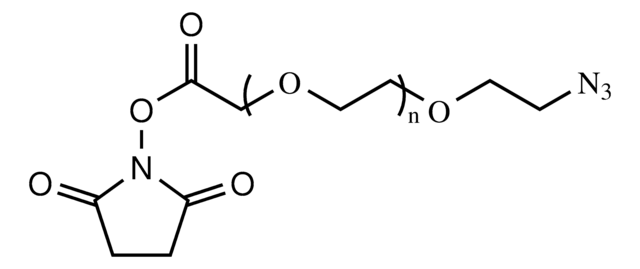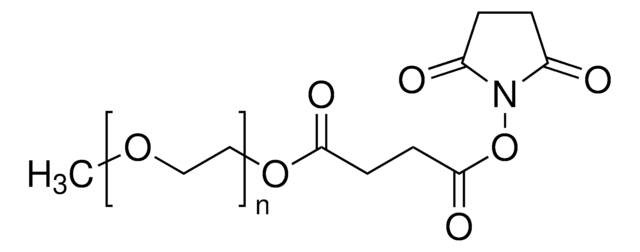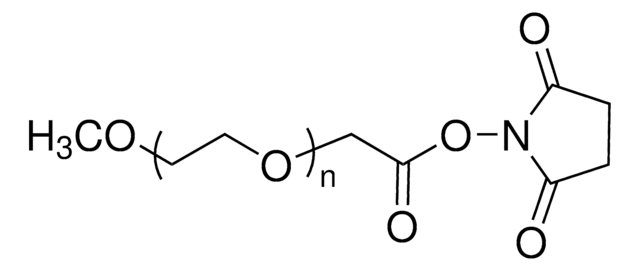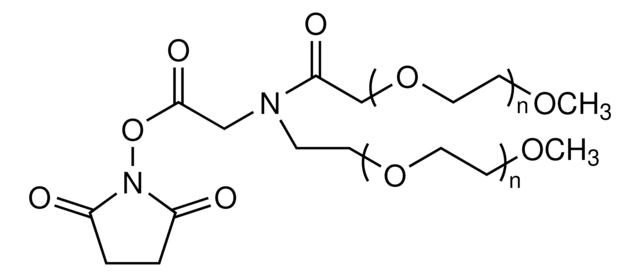JKA5078
HO-PEG-NHS
average MN 5,000, cross-linking reagent amine reactive
Synonym(s):
HO-PEG-NHS, Hydroxyl-PEG-NHS Ester, Polyethylene glycol
Sign Into View Organizational & Contract Pricing
All Photos(1)
About This Item
Linear Formula:
HO(CH2CH2O)nCH2COOC4H2O2N
UNSPSC Code:
12162002
NACRES:
NA.23
Recommended Products
Product Name
HO-PEG5K-NHS, average Mn 5,000
form
solid
mol wt
average Mn 5,000
reaction suitability
reagent type: cross-linking reagent
reactivity: amine reactive
polymer architecture
shape: linear
functionality: heterobifunctional
storage temp.
−20°C
General description
Hydroxyl-PEG-NHS Ester (HO-PEG-NHS) is hydrophilic in nature.
Application
HO-PEG-NHS may be conjugated on to a hydrophobic H40-PLA-COOH molecule to form H40-PLA-PEG-Apt) (aptamer-conjugated). Other applications may include: bioconjugation, drug delivery, PEG hydrogel, crosslinker, and surface functionalization.
Applications may include: bioconjugation, drug delivery, PEG hydrogel, crosslinker, and surface functionalization
Legal Information
Product of JenKem Technology
Storage Class Code
11 - Combustible Solids
WGK
WGK 3
Flash Point(F)
Not applicable
Flash Point(C)
Not applicable
Choose from one of the most recent versions:
Certificates of Analysis (COA)
Lot/Batch Number
Sorry, we don't have COAs for this product available online at this time.
If you need assistance, please contact Customer Support.
Already Own This Product?
Find documentation for the products that you have recently purchased in the Document Library.
Customers Also Viewed
Aptamer-conjugated and doxorubicin-loaded unimolecular micelles for targeted therapy of prostate cancer.
Xu W, et al.
Biomaterials, 34(21), 5244-5253 (2013)
Ahmet Kertmen et al.
Langmuir : the ACS journal of surfaces and colloids, 35(15), 5281-5293 (2019-03-27)
Numerous glutamine analogues have been reported as irreversible inhibitors of the glucosamine-6-phosphate (GlcN-6-P) synthase in pathogenic Candida albicans in the last 3.5 decades. Among the reported inhibitors, the most effective N3-(4-methoxyfumaroyl)-l-2,3-diaminopropanoic acid (FMDP) has been extensively studied in order to
Our team of scientists has experience in all areas of research including Life Science, Material Science, Chemical Synthesis, Chromatography, Analytical and many others.
Contact Technical Service








![O-[(N-Succinimidyl)succinyl-aminoethyl]-O′-methylpolyethylene glycol average Mn 750](/deepweb/assets/sigmaaldrich/product/structures/244/886/c80fd8d8-9a62-4a97-be17-32d83ffd1dfb/640/c80fd8d8-9a62-4a97-be17-32d83ffd1dfb.png)



![O-[N-(3-Maleimidopropionyl)aminoethyl]-O′-[3-(N-succinimidyloxy)-3-oxopropyl]heptacosaethylene glycol ≥90% (oligomer purity)](/deepweb/assets/sigmaaldrich/product/structures/367/864/1c31a65f-501f-4464-8bb3-edff0d131a12/640/1c31a65f-501f-4464-8bb3-edff0d131a12.png)
